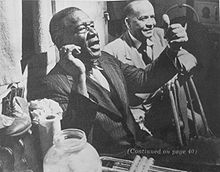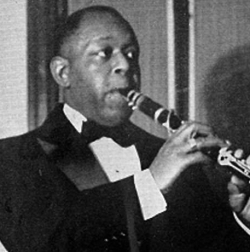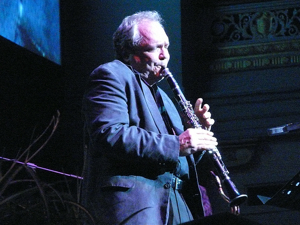
Alphonse Picou. Photo in public domain.
The big brassy sound of open-air jazz bands created a circus atmosphere in New Orleans in the early 1900s. Bands like the Tuxedo Brass Band, the Excelsior and the Onward Brass Band were a fertile breeding ground for the first generation of New Orleans horn players. Playing outdoors, unamplified, clarinetists and cornetists competed wildly for the attention of the gathering crowds, and for a brief moment in time the clarinet was king. Clarinet players were often prima donnas of marching bands, that is, except when a few star cornetists challenged their status. As early as 1900 the New Orleans Creole community was producing outstanding clarinetists— the Tio family, Alphonse Picou and George Baquet stood as role models for two generations of jazz clarinetists.
Jim Cullum says, "Alphonse Picou, a hot-shot in the Tuxedo Brass Band, became the most famous of all for his unique solo on the popular New Orleans march "High Society" —an obbligato adapted from the piccolo part.” On this program, Band clarinetist Brian Ogilvie pays tribute to Picou and his solo, which is still widely quoted in jazz improvisations on a variety of instruments and in many performance styles."

Johnny Dodds. Photo in public domain.
Three great players emerged out of the first generation of what might truly be called jazz clarinetists in New Orleans — Johnny Dodds, who played with King Oliver and later with Louis Armstrong's Hot Five and Hot Seven; the legendary Sidney Bechet, famous for the intensity of his distinctive vibrato; and Jimmy Noone, a protégé of Bechet and a veteran of the Tuxedo Brass Band who went on to lead his own orchestra in Chicago.
In early 1994 the renowned contemporary jazz reedman Ken Peplowski collaborated with The Jim Cullum Jazz Band on this radio show devoted to the clarinet in early jazz. A native of Cleveland, Peplowski is much in demand as a soloist and bandleader worldwide. Among others, he has played with Benny Goodman, Leon Redbone and George Shearing. A recent recording project features Peplowski in collaboration with piano legend Dick Hyman, a frequent Riverwalk Jazz guest. On this broadcast, Ken Peplowski and Brian Ogilvie team up on "Perdido Street Blues," a tune Johnny Dodds recorded in the 1920s.
Jimmie Noone was born on a farm outside New Orleans in 1894. He picked up the clarinet when he was only 10. He studied with both Lorenzo Tio and Sidney Bechet and jobbed around with Freddie Keppard and Kid Ory. In 1926 he was leading his own band in Chicago at one of the flashier clubs in town, The Apex. Frank Teschemacher, Benny Goodman and Pee Wee Russell all credit Jimmie Noone with influencing their playing styles. Fellow clarinetist Joe Marsala once said, "Noone would hold that horn over that great belly of his and play like it was nothing."
.jpg)
Sidney Bechet, Freddie Moore, Lloyd Phillips. Photo by William Gottlieb. Courtesy Library of Congress.
Sidney Bechet was one of the first important soloists in early jazz, but his erratic temperament hampered his career, and not until the late 1940s did he earn wide acclaim. Jim Cullum says, “Sidney Bechet is one of those figures in jazz who keeps on influencing the way the music is played long after he’s gone. You hear just one note and immediately recognize his style. He was born in New Orleans, loved New Orleans and always carried the spirit of New Orleans with him. In the ‘20s and ‘30s he became a hero in Europe and eventually made his home in France. But in a way, he never really left his home town." Clarinetists Brian Ogilvie and Ken Peplowski tackle two classics from Sidney Bechet on our show this week—“Blackstick” and “Quincy Street Stomp.” Also on our show, theater legend William Warfield reads excerpts from Sidney Bechet’s autobiography “Treat It Gentle.”
In an interview on this broadcast, Ken Peplowski talks about his major influences. Barney Bigard was a New Orleanian who studied with Lorenzo Tio, went on to star for more than a decade in the great Duke Ellington Orchestra, and also with the Louis Armstrong All-Stars. Paying tribute to Bigard, Peplowski joins the Cullum Band rhythm section and offers his blistering rendition of Duke Ellington’s ”Ring Dem Bells.”

Ken Peplowski. Photo courtesy of the artist.
Ken Peplowski also talks about how inspiring it was for him to play in Benny Goodman’s last orchestra. Brian Ogilvie joins Peplowski on a musical tribute to the King of Swing with a two-clarinet romp on “Henderson Stomp,” a Goodman feature written by Fletcher Henderson.
Other clarinet greats saluted on this broadcast include:
- Bob Crosby Band star attraction Irving Fazola, whose tour-de-force recording of Bob Haggart’s “My Inspiration” gets a soulful reading from Ogilvie and Peplowski,
- Pee Wee Russell, whose face was an emblem of Chicago-style jazz in the 1950s. Ogilvie and Peplowski play his “Pee Wee’s Tune.”
- Brian Ogivlie pays tribute to his hero, Swing Era clarinetist and bandleader Artie Shaw, with an Ogilvie original “Shaw Thing.”
Photo credit for Home Page image: Ken Peplowski. Photo courtesy of the artist.
Text based on Riverwalk Jazz script by Margaret Moos Pick © 1994

